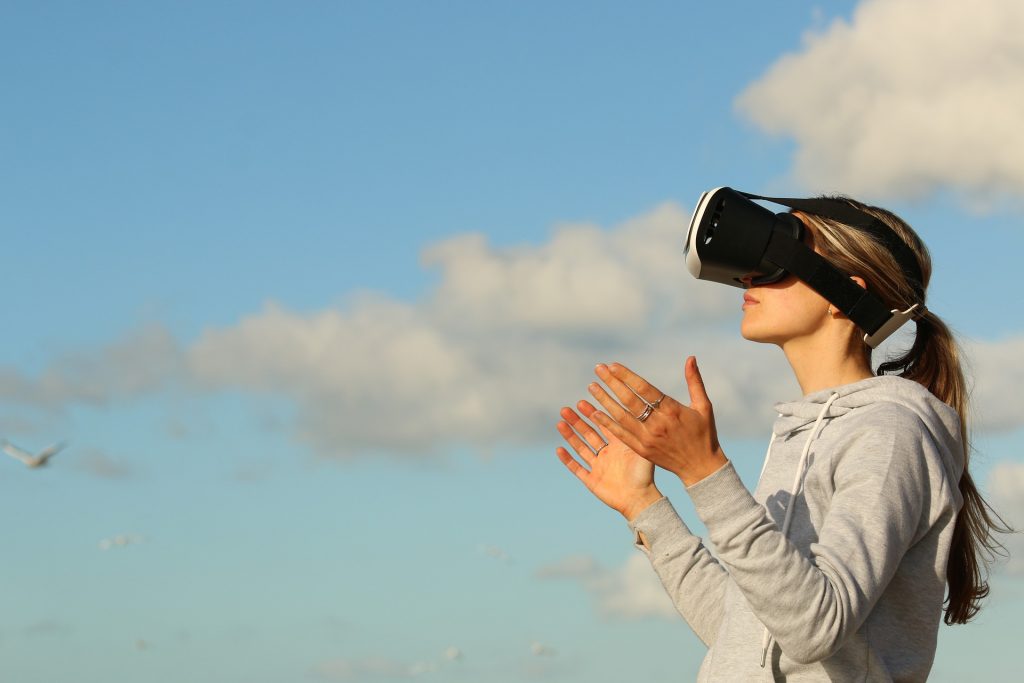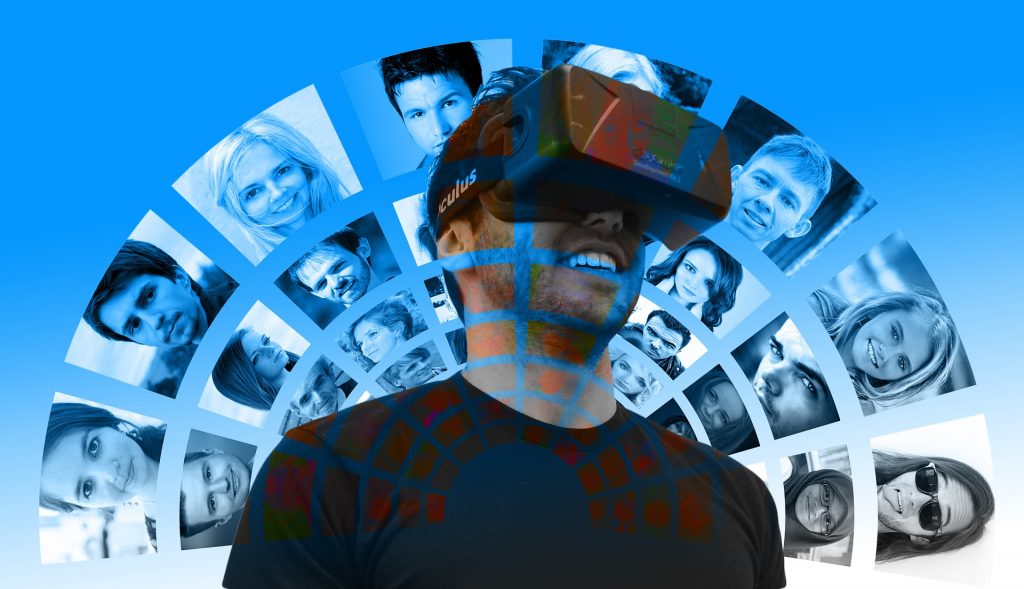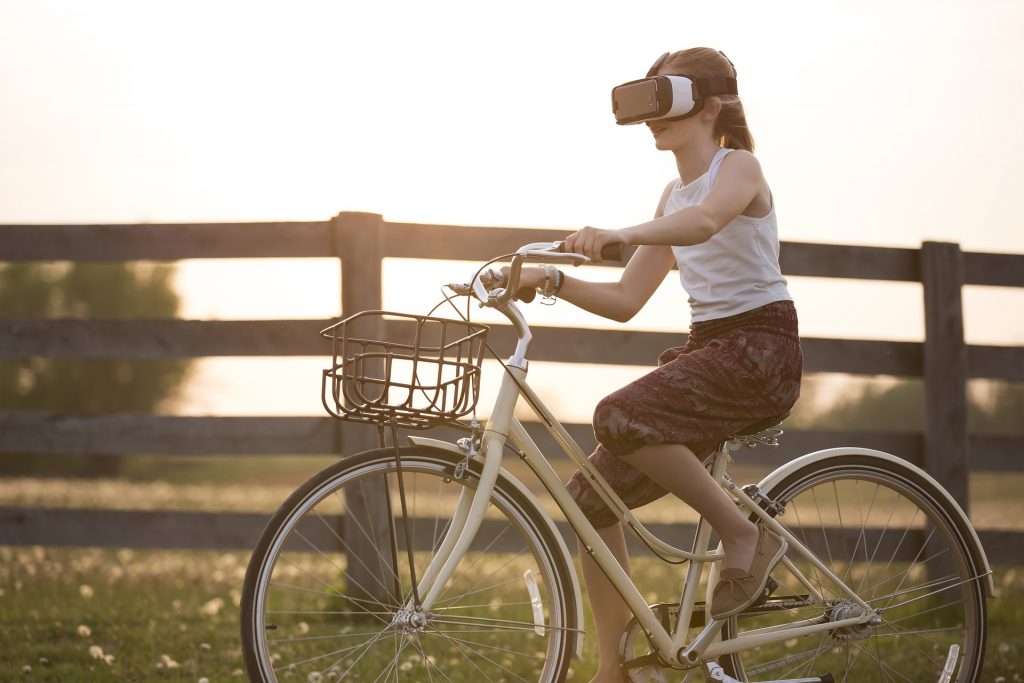If you asked me how many yabancı came to Turkey as students, I’d tell you “a lot”. But, if you asked me how many people became full-fledged, degree-seeking students after living here for a while, I’d tell you that those brave souls are a rare and unique breed. Many of us ended up in Turkey rather than coming here directly; some of us found love and life here and realized that we’re going to be in Turkey for a while. Lance G. Powell Jr., gentleman scientist, found himself in Turkey for the long haul with a young family and decided to invest his time in earning his master’s degree in cognitive science from Istanbul’s Boğaziçi University. His area of research lies in the exciting realm of social virtual reality. He’s preparing for his thesis defense this month, but he took a brief break (or escape) from that to talk with Yabangee about his life in Turkey, his research, and what the future may hold for us all.

Can you briefly talk about your path in life? How did you end up in Turkey?
Like all great stories, it happened when I was single, broke and between jobs. I got an unexpected call from a friend at an ad agency who’d been transferred to Istanbul. His wife, who I’d introduced him to, was pregnant and going back to South Korea for four months to deliver the baby. He invited me to stay in his apartment rent-free for that time. A few weeks later, I was in a taxi pulling up to his apartment complex. As of now, I’ve overstayed those original four months by about six years. But I got my own wife and child in the meantime.
You are in the process of completing your master’s degree in cognitive science at Boğaziçi University. What motivated you to go to school here in Turkey? Can you describe your experience studying here? Do you have any advice for other foreigners living here who may be considering studying at Turkish universities?
I started studying at Boğaziçi University because I’d had a string of teaching positions I was unhappy with and I didn’t see any hope for something better in Istanbul. I’ve been a fan of cognitive scientists Douglas Hofstadter and Marvin Minsky for a while, so I found a Cognitive Science program and kept my eye on it for a couple of years. I applied in 2015, believing I’d set the bar too high, but the entrance exam went great and I was accepted.
Studying here has been dramatically different from the United States. At seven years, I tried to stretch out my undergrad for as long as possible, but for my graduate degree, I’m trying to be much more expedient. I’m at least a decade older than most students, so I relate to most professors better than other students do. Students also seem a bit fearful of their teachers in university. If there’s a problem or a lingering question in the class, I’ve always been asked to talk with the professor because I’m not worried about it. And I was a university instructor before, so I can relate.
I can’t speak for Turkey at large, but I’d recommend Boğaziçi University to anyone in the US. More than anything because of the crushing student debt in American universities. If you come to a school with vision and enthusiasm, you’ll find a lot brilliant and informed people ready to help you. But one downside is the Turkish education system doesn’t seem to have the same flexibility. I know a lot of people feel trapped in their educational track, and later their careers.

When did you first get interested in virtual reality? Has there been an app or experience that you consider particularly awesome? Are there any myths about VR or social VR that you’d like to dispel?
I got into VR just before the consumer versions of the major headsets were rolled out. I was invited to an orientation event at the VR First Lab at Bahçeşehir University and I was accepted as a member then and there. I pretty quickly found an outlet for some of the ideas I’d been kicking around during my first semester of grad school. With the research potential of the new medium, I designed two research projects and completed one of them. The completed project was in doctor-patient relationships and how their discourse might change in VR. Since then, I’ve been most interested in VR-mediated discourse.
I was also turned on by gaming in VR. I grew up in the pre-millennial era when games were small and mechanics driven. But over time, developers seemed to be hashing out the same titles again and again. Since VR came with these limitation in movement, a lot of the early experiences re-introduced clever game mechanics. And because studios weren’t yet making triple-A games, they also had to be small. Fantastic Contraption is a good example since you’re standing in the same spot throughout the game, but you’re building little machines that move around the environment. It was effective in putting players in the creator role, giving them agency over their experiences. Google Tilt Brush did the same for 3D paintings and Google Blocks did it for 3D objects. These experiences have been done on computer flatscreens, but they are far superior in VR because they make the user feels so powerful.
Later on, Accounting came out as a free VR app and I still use it as a tutorial for newcomers to VR. Accounting is a hilarious, interactive narrative that gives you some potential to interact with the environment, but nothing you do can change the direction of the story. You just play with the available objects until you do something that triggers movement in the narrative. It’s an interesting form of storytelling I want to see more of. It also puts users on the spot since the game characters are always looking at you expectantly, or even threateningly, which stresses players out even though it’s not real.
For a little while, people have been clamoring for the killer app in VR, but I’ve always thought it was unfair. The experiences I’ve had were always creative, engaging, and getting better. They might not have the sophistication of PC gaming or videogame consoles yet, but these videogames have had decades to develop. VR headsets have been on the market for two years!
Your research focus is in social VR, which for those who aren’t familiar with the term refers to applications that create social interactions in a virtual space. What attracts you most to this subject? A portion of your research is focused on identifying harassment in virtual spaces. Can you talk a little about that subject? It’s certainly an important one as virtual spaces continues to become a more present and immersive experience.
Immersion in VR can be powerful, but your senses are being hijacked, so it’s isolating. For me, this was another draw to VR because I don’t like messenger services or notifications. I think the modern worldview has been skewed by the pocket telephone. And it’s a strange world where the only places to find peace are at a meditation retreat or in VR.
After my first session in VR, I asked if there were any apps that let you meet and talk with other people. At the time, there wasn’t much, so I kept an eye out. The first social VR app I found was AltspaceVR because they were broadcasting the 2016 presidential debates from within VR. I attended all of those debates, and the vice-presidential debate, and the election coverage. All of those experiences became blog posts where I shared the events and my impressions of them. I considered it a type of citizen journalism, but it also meant waking up at about 3AM since the time difference is unforgiving.
Since then, I’ve got into Rec Room, which is several games and quests in one. It takes advantage of reward seeking mechanisms in the brain by letting players level up and giving them treasure boxes. When I have time, I also want to spend more time in content creation in VR with apps like High Fidelity, VR Chat and Anyland. I haven’t yet taken ownership of experiences since I always feel like I’m having fun in someone else’s house.
The human element is what always brings me to VR. Every time I visit a familiar environment or play a game in Rec Room for the hundredth time, I’m always getting something new because of the people I’m with. People who are experienced in social VR can make you laugh and you feed one another’s drive to win. If a player is new or a bit shy, it’s always great to engage them and help bring them out of their shell. I do it because I want them to come back and be a part of the community. In fact, I’ve also met multiple people in social VR who have admitted to extreme social anxiety and they’ve used the platform to help get over it. They’ve even shown improvement outside VR, in their daily life. For me, social VR is the perfect venue to meet new people since it allows me to connect with people I enjoy being with. But if I’m not having a good time with someone, I’m not obliged to stay. I can just leave and talk to someone else.
Dealing with harassment in social VR is all I do now and most of it is done for the sake of new users. These platforms want people to have a good impression of social VR, but their power to do that is limited in a way. You might curate the best virtual environment in the world, but people aren’t going to enjoy it if they’re surrounded by creeps and perverts. Platforms can write a code of conduct to tell you what’s expected of users, but typically nobody reads them except for me. Creating and maintaining cultural norms within social VR is a much more effective way of sending a message to users. If someone crosses a line and becomes abusive, there need to be effective tools for warning them and blocking them. In most social VR, the tools already exist, but the new users might not have the patience to navigate those tools or the cognizance to understand what’s happening in a harassment scenario. Experienced social VR users are often confused by this though. They have already established friendships and they spend most of their time hanging out with those people. They learned how to recognize someone with a toxic personality and avoid them. If they meet a harasser, they will stand up to them, block them, and then laugh about it later. Unfortunately, new users unlucky enough to meet a harasser might leave feeling like social VR is just a haven for ill-mannered tweens, which is not true.

What can you say about the virtual community in Turkey? Is it particularly large or well mannered?
The virtual community is wildly creative in Turkey and I really like hearing about their dreams for VR. If you have questions about developing for VR, you also find a lot of support and they sincerely want you to succeed. But I think the flame of imagination burns a little too brightly for most people. Most of the projects I’ve seen are abandoned too quickly because nobody is pushing these teams to be diligent, stay on task and work through these problems. I know a few good VR mentors in Turkey, but there should be more. In my own university, nobody knew anything about VR, much less social VR, so the theories I work with got their start in virtual worlds like Second Life, social media platforms, and earlier generations of VR like MUDs. I think the future developers of VR, especially outside the US, will have had to bootstrap their abilities like I have.
What are your plans after you complete your master’s program? Will you continue your studies here or elsewhere? Does the private sector hold any interest for you these days with investment in VR and AR technology so high?
I’ll be looking for work in the private sector, social VR. Some of my skills can be transferred to social media and dealing with their concerns about trolling, but I’d rather stay in social VR. These past years have been so fulfilling, and it’d be a shame to give it up because the opportunity to continue was not there. I’m also going to try my hand in game development, joining Hackathon teams and brushing up on my art skills.
Since we’re both expats and this interview is for Yabangee, I wanted to you ask a far-sighted question about the future of discretionary migration in light of developments in VR. Do you think that in the near future the creation of virtual spaces, particularly persistent worlds, will compete with real world travel? Will persistent worlds full of interesting people, adventure, and social interaction make the wandering, backpacking expat a thing of the past? Hell, will even English teaching abroad go the way of the dinosaur… toward Jurassic World VR?
Why not? I remember some guys made a simulation of Amsterdam in Second Life in a couple days and sold it for $50,000. And this was about 10 years ago.
There’s been a lot of speculation about these things and they’re fun thought experiments, but technology doesn’t exist in a bubble and we have to look at the real-world factors too. And that’s complicated. Concerns about global security or an ecological disaster could ground a lot of airplanes, bringing many more people to virtual worlds, where visitors are free to meet other people, explore, engage in emotional and physical intimacy. Advances in A.I. could enable an infinite number of procedurally generated worlds, indistinguishable from reality, optimized for the enjoyment of humans. The fear of potential bullying or sexual abuse could lead parents to enroll their kids in virtual schools, where they would be protected. The list can go on and on.
I know that Google Expeditions has already gone to schools around the world to take students on virtual fieldtrips they can’t otherwise afford. Elder care facilities are also using VR to soothe Alzheimer’s patients when they become distressed. There have been loads of phobia studies, even in Istanbul. So, the main purpose of VR could turn out to be delivering the pleasures of the world that people are otherwise unable to enjoy them because they’re too poor, disabled, or just don’t have the confidence.
I do know that the desire for agency and the ability to connect with other humans is nearly universal. To its credit, VR offers both of them. Whenever I sign into a social VR platform, I’m excited for the people I’ll meet, the games we’ll play, and the stories that might come from it.









